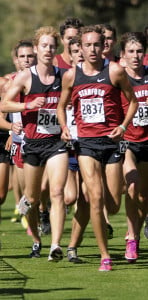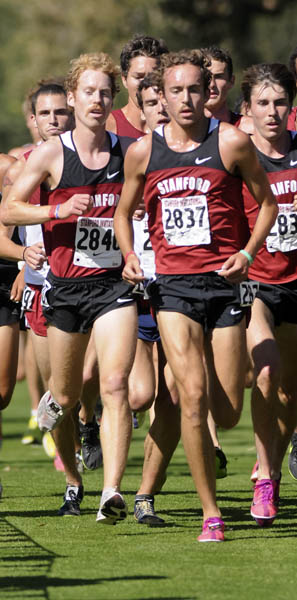Chris Derrick has had a good run so far. The 2012 graduate received a degree in economics with a focus in law and has become one of the most decorated distance runners in Stanford history.

But it wasn’t always that way. Until high school, Derrick played basketball and baseball but found that his lack of ability left him at a dead end. Fearing that he wouldn’t participate in any activities in high school, his parents forced him to take part in a cross-country summer camp. One practice later, he knew he had found his sport.
He improved drastically throughout his high-school career at Neuqua Valley High School in Naperville, Ill., to become the 2007 Gatorade National Boys Cross-Country Runner of the Year, the 2008 Nike Cross Nationals individual and team champion and the 2008 Illinois cross-country state champion. Derrick broke the record for the high school-only 5,000 meters with a time of 13:55.96.
Derrick solidified his place in Stanford lore with records of 13:19.58 in the indoor 5,000, 7:46.81 in the indoor 3,000 and 27:31.38 in the 10,000. Additionally, he is a 14-time All-American in cross-country and track and field, a three-time NCAA runner-up and one of only six men to place in the top 10 at the NCAA Cross Country Championship for four consecutive years.
At the beginning of his final year at Stanford, he considered making the U.S. Olympic team as a possibility but never thought that he would get as close as he did. Derrick’s bid for a spot on the team soon became an attainable reality, as he ran two Olympic qualifying “A” times early in the season for the 5,000 and 10,000 at the Millrose Games in February and the Payton Jordan Cardinal Invitational in May, respectively. His 10,000 time of 27:31.38 made him a favorite to make the U.S. team, as it set an American collegiate record and was the fastest time run by an American going into the Olympic trials this season.
Despite his early successes, Derrick’s hectic schedule as a graduating senior, coupled with a heavy running regimen and foot injury late in the season, began to wear on his performance. He finished his collegiate career running the 10,000 at the NCAA Outdoor Track and Field Championships on June 6 at Drake Stadium in Des Moines, Iowa. He put up a fight with leaders Cam Levins and Stephen Sambu and stayed with the front of the pack with one lap to go but was outkicked mentally and physically, falling back as Levins and Sambu finished in 28:07.14 and 28:09.52, respectively. Derrick’s disappointing third-place finish with a time of 28:17.28 capped his streak of never winning an NCAA championship.
Following the race, Levins highlighted Derrick’s success and apologized in an interview with Flotrack.
“I’m sorry to Chris,” Levins said. “It’s his last race; he’s definitely the best collegiate to never win an NCAA title. I’m sorry to have taken that away from him. I know he wanted it so badly.”
But Derrick’s loss didn’t prevent him from trying to reach his ultimate goal. On the rainy evening of June 22, Derrick surged back to run the 10,000-meter final at the Olympic track and field trials at Hayward Field in Eugene, Ore.
“I just wanted to do the type of race that would get me an ‘A’ standard and go fast and hope that I would get in the top three,” Derrick said. “But I didn’t run too differently from normal. I just stayed with the leaders as long as possible.”
The race began according to plan: He moved from the back of the pack to fifth and planned to battle it out with Matt Tegenkamp as they ran 5,000 meters together. With 10 laps to go, however, Tegenkamp picked up the pace and made a bid for third, creating a gap that Derrick struggled to fill, as he finally came in fourth with a time of 27:40.23, behind Galen Rupp (27:25.33), Tegenkamp (27:33.94) and Dathan Ritzenhein (27:36.09).
“I felt like it was a pretty good race, given the chances at the end of a very long collegiate season,” Derrick said. “My body was pretty worn down and my foot was injured, but it was a good effort. It still was a bit of a lost opportunity, but I’m not too disappointed.”
Despite not making the Olympic team and having an aggravated foot injury that kept him out of the 5,000, Derrick remains optimistic. He is the main alternate for the U.S. team if any of the top three finishers are unable to compete at London, and he plans to go professional and get a sponsorship following this season. And the 21-year-old has not given up on the Olympics yet.
“I plan to run and train and hopefully be around in another four, eight years,” Derrick said.
